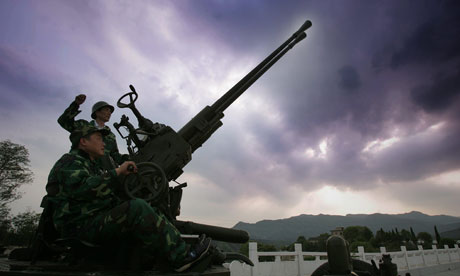US intelligence community warns of rising climate security threat
National Intelligence Council acknowledges climate change and related impacts on resources present emerging security risk

Artillery soldiers at the reserve army fire shells for artificial rains in Wuhan in central China's Hubei province 09 May 2011. Photograph: Feng Zi/EPA
Climate change has the potential to stoke regional instabilities and fuel international tensions, according to a major new report from the US National Intelligence Council.
Released yesterday, the Global Trends 2030 report seeks to map out the security trends that will shape international relations over the next two decades. It is the latest in a series of studies from national security bodies around the world to acknowledge that climate change and its likely impacts on food, water, and natural resource supplies represents an emerging security threat.
"Demand for food, water, and energy will grow by approximately 35, 40 and 50 per cent respectively, owing to an increase in the global population and the consumption patterns of an expanding middle class," the report states. "Climate change will worsen the outlook for the availability of these critical resources."
The report argues that scarcities can be avoided, but only if co-ordinated steps are taken to improve productivity and efficiency across a raft of industries and economies.
"We are not necessarily headed into a world of scarcities, but policymakers and their private sector partners will need to be proactive to avoid such a future," the report states. "Many countries probably won't have the wherewithal to avoid food and water shortages without massive help from outside."
It also acknowledges that a series of technology breakthroughs will be needed to address climate-related risks. "Key technologies likely to be at the forefront of maintaining [energy, food and water] resources in the next 15-20 years will include genetically modified crops, precision agriculture, water irrigation techniques, solar energy, advanced bio-based fuels, and enhanced oil and natural gas extraction via fracturing," the report argues.
"Given the vulnerabilities of developing economies to key resource supplies and prices and the early impacts of climate change, key developing countries may realise substantial rewards in commercialising many next-generation resource technologies first.
"Aside from being cost competitive, any expansion or adoption of both existing and next-generation resource technologies over the next 20 years will largely depend on social acceptance and the direction and resolution of any ensuing political issues."
In addition to concerns about resource security, the report warns climate change is likely to lead to increased migration, particularly in Asia and Africa in the 2020s, which could lead to the escalation of pre-existing regional tensions.
It also predicts that the increased likelihood of disruptive "black swan" climatic events, such as the recent floods in Pakistan or Hurricane Sandy in the US, could represent a security risk in certain regions.
"Dramatic and unforeseen changes are already occurring at a faster rate than expected," the report warns. "Most scientists are not confident of being able to predict such events. Rapid changes in precipitation patterns – such as monsoons in India and the rest of Asia – could sharply disrupt that region's ability to feed its population."
However, the report does note one "positive" security development from the energy sector, arguing the US shale gas boom represents a "tectonic shift" that will allow the country to become energy independent. But it also acknowledges that "debates over environmental concerns about fracturing, notably pollution of water sources, could derail such developments".
No hay comentarios:
Publicar un comentario